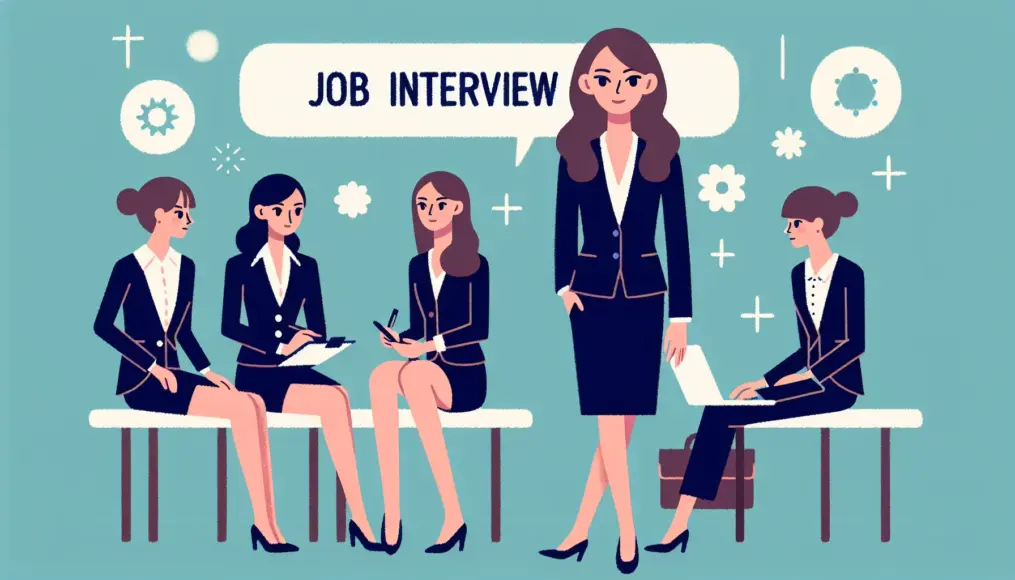When it comes to job interviews, being prepared for the questions you might face is essential for a successful outcome. Understanding what to expect allows you to approach the interview with confidence.
In this article, we’ll focus on some frequently asked questions in job interviews and share effective strategies for answering them.
- How to understand what interviewers are looking for
- Key points to include in your self-introduction
- Techniques for leaving a positive impression with your questions
Common Questions Asked in Job Interviews
When it comes to job interviews, you’ll encounter a variety of questions.
Familiarizing yourself with the most frequently asked questions can help you respond with confidence.
In this article, we’ll discuss what interviewers are looking for and how to understand the intent behind their questions.
What Interviewers Are Looking For
Interviewers typically have specific intentions behind the questions they ask.
For instance, by inquiring about your self-introduction or reasons for changing jobs, they aim to gauge your personality and motivations.
It’s essential to prepare thoroughly for these types of questions.
- Interviewers want to assess your skills and experience.
- They are looking to evaluate your character and fit within the team.
- They seek candidates who align with the company culture.
How to Understand the Intent Behind Questions
By grasping the intent behind the questions, you can provide more appropriate responses.
For example, when asked, “Why are you considering a job change?” the interviewer is probing into your experiences at your previous job and any dissatisfaction you may have with your current workplace.
Responding with positive reasons can leave a good impression on the interviewer.
Additionally, referring to Tips for Successful Job Interviews: Question Strategies and Surprising Insights can help you prepare even more effective responses.
- Consider the underlying intent behind the question.
- It’s important to convey positive reasons.
- Incorporating specific anecdotes can be particularly effective.
Key Points for an Effective Self-Introduction
In a job interview, your self-introduction is crucial.
It’s your first opportunity to make a lasting impression on the interviewer.
Let’s dive into what you should include in your self-introduction and what pitfalls to avoid.
What to Include in Your Self-Introduction
When introducing yourself, it’s important to summarize your background and skills succinctly.
Make sure to clearly communicate why you’re looking to make a career change and how you can contribute to the company you’re interviewing with.
Highlighting your strengths and special skills can also leave a positive impression on the interviewer.
- Summarize your background concisely
- Clearly explain your reason for changing jobs
- Showcase your strengths and special skills
Common Mistakes to Avoid in Your Self-Introduction
There are several things to steer clear of when crafting your self-introduction.
For instance, avoid making your introduction too long or using negative language.
Additionally, speaking in a self-centered manner or putting down other applicants can leave a bad taste.
Interviewers want to get a sense of your personality and values through your self-introduction, so it’s essential to be mindful of these aspects. If you want a comprehensive guide on preparing for interviews, check out The First Step to Success! A Detailed Guide on Interview Preparation Tips.
- Avoid lengthy introductions
- Don’t use negative language
- Steer clear of disparaging other applicants
How to Effectively Communicate Your Reasons for Changing Jobs
During job interviews, it’s common for candidates to be asked about their reasons for wanting to change jobs.
How you respond to this question is crucial.
Let’s explore some key points to help you express your feelings clearly while leaving a positive impression.
Structuring Your Reason for Leaving
When discussing your reasons for changing jobs, it’s important to reflect on your own experiences.
By clarifying why you want to leave your current workplace, you’ll be able to provide a well-thought-out answer.
Specifically, consider whether you’re seeking growth or hoping for improvements in your work environment.
- Reflect on your experiences
- Clarify your reasons for leaving
- Communicate your specific hopes
Tips for Conveying a Positive Impression
It’s essential to frame your reasons in a positive light.
For instance, instead of saying, “I’m unhappy with my current job,” a more effective expression would be, “I’m looking for new challenges.”
Emphasizing what you’ve learned and how you’ve grown in your previous role can also leave a favorable impression on the interviewer.
Additionally, it’s beneficial to deepen your understanding of self-introductions and how to prepare for interview questions. For more insights, check out Common Questions for Career Changers and How to Tackle Them! Key Points for Success.
- Use positive language
- Express your eagerness for new challenges
- Highlight your learning and growth from previous roles
Techniques for Leaving a Positive Impression with Your Questions
In job interviews, asking thoughtful questions is incredibly important.
This practice, known as “reverse questioning,” occurs after the interviewer has asked their questions and invites you to pose your own.
By effectively utilizing reverse questions, you can make a memorable impression on the interviewer.
The Importance of Reverse Questions
Reverse questions present a fantastic opportunity to showcase your interest and enthusiasm.
By inquiring about how you can grow within the company or the team dynamics, you can demonstrate your proactive attitude.
Additionally, asking these questions allows you to assess whether the company is a good fit for you.
- Show your enthusiasm through reverse questions
- Ask about the team and work environment
- Determine if the company aligns with your values
Specific Examples of Reverse Questions
The types of reverse questions you choose to ask can significantly influence the impression you leave.
For instance, asking, “What skills are necessary for success in this position?” effectively conveys your eagerness to grow.
Similarly, by saying, “Could you share your vision for the company’s future?” you express your genuine interest in the company’s direction.
Furthermore, referring to reverse questions you can use in executive interviews can help you formulate even more impactful questions.
- “What skills are necessary for success in this position?”
- “Could you share your vision for the company’s future?”
- “What is the team dynamic like?”
Summary
Understanding the common questions asked in job interviews is a crucial step toward success.
By mastering your self-introduction, articulating your reasons for changing jobs, and honing your skills for asking insightful questions, you can leave a positive impression on your interviewer.
Be well-prepared and showcase your strengths to the fullest.
- It’s important to grasp what interviewers are looking for.
- Keep your self-introduction concise while highlighting your strengths.
- Use your questions to demonstrate your interest and enthusiasm.
Approach your upcoming interviews with confidence! We’d love to hear about your experiences and questions in the comments.



Comment